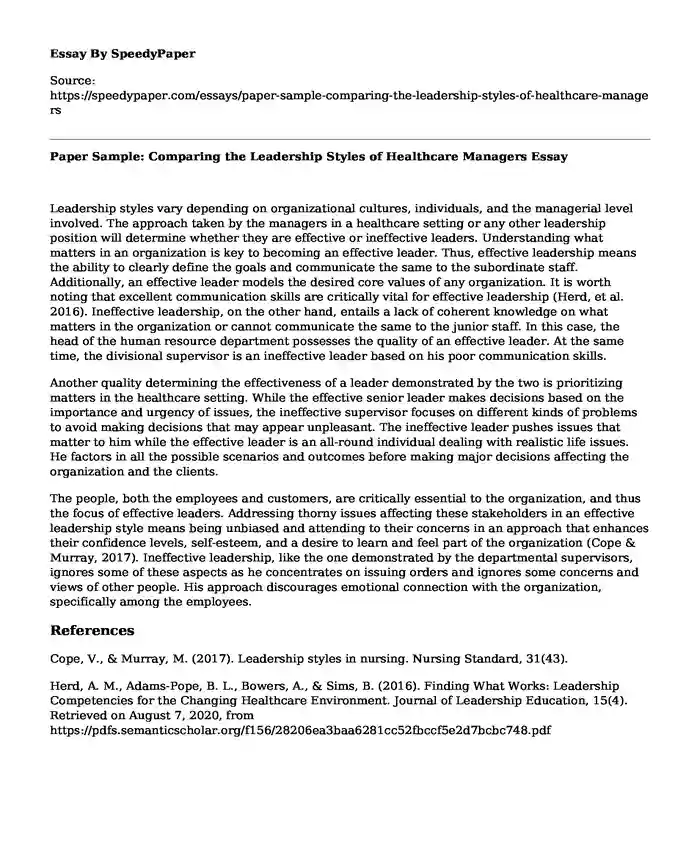
| Type of paper: | Essay |
| Categories: | Management Healthcare Leadership style |
| Pages: | 2 |
| Wordcount: | 414 words |
Leadership styles vary depending on organizational cultures, individuals, and the managerial level involved. The approach taken by the managers in a healthcare setting or any other leadership position will determine whether they are effective or ineffective leaders. Understanding what matters in an organization is key to becoming an effective leader. Thus, effective leadership means the ability to clearly define the goals and communicate the same to the subordinate staff. Additionally, an effective leader models the desired core values of any organization. It is worth noting that excellent communication skills are critically vital for effective leadership (Herd, et al. 2016). Ineffective leadership, on the other hand, entails a lack of coherent knowledge on what matters in the organization or cannot communicate the same to the junior staff. In this case, the head of the human resource department possesses the quality of an effective leader. At the same time, the divisional supervisor is an ineffective leader based on his poor communication skills.
Another quality determining the effectiveness of a leader demonstrated by the two is prioritizing matters in the healthcare setting. While the effective senior leader makes decisions based on the importance and urgency of issues, the ineffective supervisor focuses on different kinds of problems to avoid making decisions that may appear unpleasant. The ineffective leader pushes issues that matter to him while the effective leader is an all-round individual dealing with realistic life issues. He factors in all the possible scenarios and outcomes before making major decisions affecting the organization and the clients.
The people, both the employees and customers, are critically essential to the organization, and thus the focus of effective leaders. Addressing thorny issues affecting these stakeholders in an effective leadership style means being unbiased and attending to their concerns in an approach that enhances their confidence levels, self-esteem, and a desire to learn and feel part of the organization (Cope & Murray, 2017). Ineffective leadership, like the one demonstrated by the departmental supervisors, ignores some of these aspects as he concentrates on issuing orders and ignores some concerns and views of other people. His approach discourages emotional connection with the organization, specifically among the employees.
References
Cope, V., & Murray, M. (2017). Leadership styles in nursing. Nursing Standard, 31(43).
Herd, A. M., Adams-Pope, B. L., Bowers, A., & Sims, B. (2016). Finding What Works: Leadership Competencies for the Changing Healthcare Environment. Journal of Leadership Education, 15(4). Retrieved on August 7, 2020, from https://pdfs.semanticscholar.org/f156/28206ea3baa6281cc52fbccf5e2d7bcbc748.pdf
Cite this page
Paper Sample: Comparing the Leadership Styles of Healthcare Managers. (2023, Nov 06). Retrieved from https://speedypaper.com/essays/paper-sample-comparing-the-leadership-styles-of-healthcare-managers
Request Removal
If you are the original author of this essay and no longer wish to have it published on the SpeedyPaper website, please click below to request its removal:
- Personal Development Plan - Leadership Essay Example
- Free Essay: Social Media and Eating Disorders
- Research Proposal Paper Sample: Prospection and Its Effect on Depression and Anxiety
- Free Essay Providing an Overview of HIV/AIDs in Peru
- Essay Sample on Voluntary Nurse Turnover
- Essay Sample on Religion and Medicine
- Essay Example: Community Health Nurses
Popular categories




